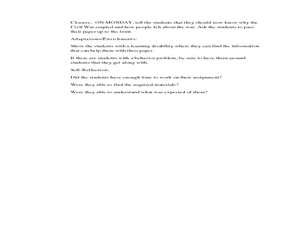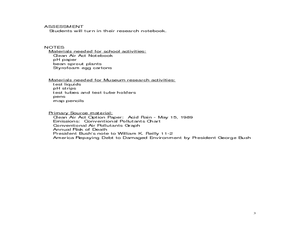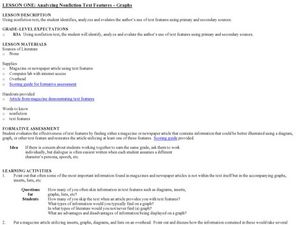Curated OER
Experiencing the Civil War
Eleventh graders examine the Civil War. In this American History lesson, 11th graders investigate the causes, effects, and the lives of people during the Civil War. Students develop a research paper using various...
Curated OER
Writing a Formal Thank You Letter
Students research various formats for writing thank you letters in resource books and through a provided Internet site. They use these resources to write a thank you letter to a recent outside speaker who visited their class.
Curated OER
The Mystery of the Lost Colony of Roanoke
Students research the Lost Colony of Roanoke by interpreting John White's diary as a primary source.
Curated OER
Will the Real Ben Franklin Please Stand Up?
Students explore the life of Benjamin Franklin. In this American history lesson plan, students research primary and secondary documents regarding Franklin's life. Students should examine the point of view each of the accounts is written...
Curated OER
Why Not Come to North Amercia?
Students examine the motives for French expansion into the New World, they evaluate primary source documents to determine who, what, when, where and why.
Curated OER
Women’s Suffrage
Young scholars examine several aspects of the Women's Suffrage Movement. In this women's rights lesson, students explore several primary and secondary sources regarding the events of the movement, opposition to the movement, and the...
Curated OER
What Would You Do?
Eleventh graders determine whether or not they would have dopped the atomic bomb. In this Truman presidency lesson, 11th graders research primary and secondary sources about the Manahattan Project and World War II. Students...
Curated OER
Designing The Character Of Louisiana Purchase Louisianians
Students investigate the history of the Louisiana Purchase. They gather information using a digital library and internet resources. The information is used to construct a detailed summary of how the people of time lived. They also use...
Curated OER
Forced to Flee: Famine and Plague
Students examine events the lead people to emigrate. In this Irish Potato Famine lesson, students research primary and secondary sources regarding the Irish Potato Famine and collaborate to create a classroom mural depicting the famine...
Curated OER
CLEAN AIR ACT (1990)
Students investigate the effects of acid rain by conducting an experiment with bean sprouts and graph the results. In this Environmental Policy lesson, students visit a museum to identify examples of foreign and domestic policy on...
Curated OER
The Early American Temperance/Anti-tobacco Movement
Tenth graders consider movements to regulate alcohol and tobacco use. In this Temperance Movements lesson plan, 10th graders compare and contrast movements in the 1800's and the modern era as they research selected primary and secondary...
Curated OER
Live from Channel 22
Learners explore 1920s America. In this American history instructional activity, students research primary and secondary sources in order to examine the events and noteworthy people of the time period. Learners use their...
Curated OER
The Civil War through a Child's Eye
Students read Paul Fleischman's Bull Run in Readers Theater format. Next, students examine and interpret primary source images of Civil War era students and reveal their understanding of a child's perspective in a literary portrait.
Curated OER
ST PATRICK'S DAY
Students explore the many elements of the Irish festival St. Patrick's Day. They research online resources to collect data. Students view magical stones, Irish fairies, hidden treasures, and lucky charms. They in addition read about the...
Curated OER
Language Arts: Gathering the Appropriate Information
Students are able to use the library and/or computer lab to research reliable information sources supporting arguments being put forward in the position paper. They are able to find examples of mission statements from various...
Curated OER
Job research for a job pamphlet
Students use a variety of resources to research a job that interests them.
Curated OER
Deerfield Debates Its Future: What Constitutes Progress?
Learners explore the many resources that one can use to explore a community, the Colonial Revival movement, and how the industry and technology reshaped life in Deerfield the Connecticut River Valley.
Curated OER
Stamp It
Learners pick a theme related to the Mississippi River Valley and conduct research using a variety of resources while constructing a commemorative stamp of the topic. The stamp is made using a visual image found in the information.
Curated OER
Exploring the Library
Students explore ways to use the library as a resource for accessing research material. Working individually, they participate in a teacher created library scavenger hunt to aid in locating fiction and nonfiction material as well as...
Curated OER
Discovering the Local Community
Third graders create a mini-atlas of the human and physical characteristics of their local community, which includes landforms, climate, vegetation, population, and economics. They use nonfiction map-related resources to obtain ...
Curated OER
Exploration Within the Lewis and Clark Expedition
Students explore with Lewis and Clark. In this research skills lesson, students analyze primary and secondary source links to study the accomplishments of the Lewis and Clark expedition. Students use their findings to create...
Curated OER
Social Studies - Concentration Camps -2
Eighth graders investigate the typical day in a concentration camp. In this Holocaust lesson, 8th graders read primary and secondary sources about the conditions of the camps. Students also conduct research about the Warsaw Ghetto,...
Curated OER
Seismic Waves
In this seismic waves worksheet, students read and study the science of earthquakes using online resources to complete 8 short answer questions.
Curated OER
Analyzing Nonfiction Text Features - Graphs
Students examine the text features of non-fiction. In this literacy instructional activity, students practice reading graphs and discover the authors intent for using them in primary and secondary sources.























